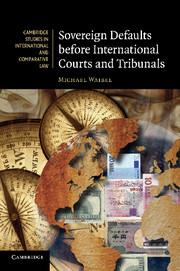Book contents
- Frontmatter
- Contents
- Preface
- Note: measuring sovereign liability over time
- Table of cases
- Table of treaties
- List of abbreviations
- Part I Sovereign defaults across time
- Part II The future role of arbitration on sovereign debt
- 10 ICSID arbitration on sovereign debt
- 11 Overlapping jurisdiction over sovereign debt
- 12 Sovereign default as trigger of responsibility
- 13 Compensation on sovereign debt
- 14 Building durable institutions for the international adjudication of sovereign debt
- Bibliography
- Index
- Cambridge Studies in International and Comparative Law
11 - Overlapping jurisdiction over sovereign debt
Published online by Cambridge University Press: 01 June 2011
- Frontmatter
- Contents
- Preface
- Note: measuring sovereign liability over time
- Table of cases
- Table of treaties
- List of abbreviations
- Part I Sovereign defaults across time
- Part II The future role of arbitration on sovereign debt
- 10 ICSID arbitration on sovereign debt
- 11 Overlapping jurisdiction over sovereign debt
- 12 Sovereign default as trigger of responsibility
- 13 Compensation on sovereign debt
- 14 Building durable institutions for the international adjudication of sovereign debt
- Bibliography
- Index
- Cambridge Studies in International and Comparative Law
Summary
The municipal law of an important financial centre almost invariably governs sovereign bonds. Analogously, modern debt instruments are subject to the jurisdiction of the courts in these few select jurisdictions. ICSID could enjoy concurrent jurisdiction over contract and treaty claims to the contractually chosen forum. This scenario could lead to jurisdictional conflicts and parallel proceedings between national courts and ICSID tribunals.
While current international law has few rules to resolve such conflicts, such jurisdictional overlaps are common in international investment law. However, this chapter will argue that as sovereign bonds lack a specific connection to ICSID these jurisdictional conflicts are particularly acute in the debt context. Arbitration under ICSID auspices threatens to upset expectations in the sovereign debt market and dispute resolution in national courts. The advent of restrictive sovereign immunity and the widespread use of waivers paved the way for litigation in national courts by sovereign creditors. Since the 1970s, sovereign creditors have exhibited a strong preference for dispute settlement in the national courts of important financial centres, such as London and New York. The perceived advantages of these courts over arbitration include a strong commitment to the sanctity of contract and the resulting legal certainty; a high degree of expertise with financial instruments; adjudication solely on the basis of the applicable contract law and the availability of summary judgment. As a result, arbitration on sovereign debt has been extremely rare over the last four decades.
- Type
- Chapter
- Information
- Sovereign Defaults before International Courts and Tribunals , pp. 252 - 272Publisher: Cambridge University PressPrint publication year: 2011



